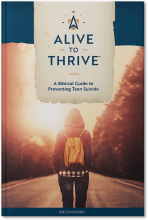
Homemade Meals for Busy Families
Mary Beth Lagerborg, co-creator of Once-A-Month-Cooking, discusses the importance of hospitality and how families can prioritize dinner time by cooking a month’s worth of healthy meals in one session.
Rescue 2x the babies from abortion!
Home » Episodes » Focus on the Family Broadcast » Walking Through Depression
Excerpt:
Paul Asay: But if you just take it one step at a time, can you take one more step? Can you take that step to the next day? Can you take that step to the next hour? Can you move forward? That is so important when you’re dealing with depression, just the ability to push forward.
End of Excerpt
John Fuller: Well, that’s Paul Asay and he joins us today on Focus on the Family. And your host is Focus president and author Jim Daly. Thanks for joining us. I’m John Fuller.
Jim Daly: You know, John, I think depression literally affects everybody because if it’s not directly impacting you with a family member, I’m sure there’s a friend or someone you know at church where depression is impacting them.
John: Mm-hmm (affirmative).
Jim: And today’s program, we are going to speak to this issue very candidly. Uh, according to the National Alliance of Mental Health, more than 17 million US adults, over 7% of the population had at least one major depressive episode in the last year. That number could be going up because of, uh, you know, the pandemic issues and all those things. Uh, and anxiety disorders seem to go hand in hand with depression. Over 40 million adults in the US, 19% of the population, uh, have dealt with some form of anxiety. And our guest today, as you mentioned, has walked through these mental afflictions and he has some very strong, very personal insights into that dark world of anxiety and depression. And his story is what you’re going to hear today. And I am hopeful that it will give you the hope that you need to get through another day.
John: Yeah, there’s a message of healing in Christ here. And Paul is a senior associate editor at Plugged In. That’s our team that reviews movies, and TV, and games, and more, and they really, uh, center on media discernment for families. And you can hear him on the weekly Plugged In Show podcast. He’s an award-winning journalist and author, and really has a beautifully captured his journey with depression in a new book called Beauty In The Browns.
Jim: Paul. It’s so good to have you back in the studio. This is your second time.
Paul: Second time. (laughs) Last time I was talking about movies, which is a little more cheerful of a subject.
Jim: Yeah, right. But we’re so grateful for the role that you play with Plugged In. I know many parents listening and watching appreciate your advice that you give them. Why does that excite you to walk in the door every day, looking at pop culture, through video games and movies and all of that stuff? To me, it’d be a downer. (laughs)
Paul: You know, it really is exciting. I’m, I’m a story guy. I love stories. I, I get jazzed when I listen to other people’s stories and the stories that I see on screen, or even in video games, they have always resonated with me. The power of entertainment in our culture has never been as powerful as it is today. And so, because of that, I feel like the team at Plugged In is able to you know, scratch an itch that I think a lot of parents have. They need to know about this sort of stuff. And so, because of that, it really feels like, like we’re meeting a need and there’s nothing more rewarding than coming in and talking about, you know, a met need.
Jim: Yeah. Uh, a couple of years ago, um, you had a situation with your son that I think does aluminate the struggle you face with depression. And again, this is something that you’ve written about now, this is something I’m familiar with. My wife, Jean has struggled with anxiety and depression. So, you know, we know what that is like. Um, so as we ask these very intimate questions, I hope, you know, the listeners, this is all for the betterment of people listening. We’re not forcing you to be here or anything like that. (laughs)
Paul: Right, right. Exactly.
Jim: But we need to get down to the serious issues. And so a couple of years ago you had this interaction with your son and it helped you kind of understand where you were at, what happened?
Paul: It was, um, it was one of the most difficult moments of my life. Uh, what happened is my son, he’s a young adult now, he is living at home, he actually od’ed. He overdosed on some pain medication and some cold medication. Um, we took him to the emergency room. We spent all night with him. He went to a suicide prevention place where he was able to spend a few days there. Um, he was obviously struggling with some issues that, um, we knew about, but I don’t think fully grasped, fully realized. And as he sort of came out of that, we were able to sort of, um, grapple with that a little bit more. And I realized much to my shame, honestly, that my son and I had never really talked about the issues of anxiety and depression.
Jim: Yeah. Uh, I’m going to ask you what depression looks like in just a moment. But just to, to inform the listeners, uh, you know, CDC did a report not long ago, that 3000 teenagers, this doesn’t count junior high and elementary school, but 3000 teenagers a day are attempting suicide right now. That should alarm all of us. And when you add in the junior high and elementary school kids, it’s quite an astonishing number. And again, that’s why we want to cover this. And with that in mind, uh, how prevalent that is, what are the signs of depression? What does it look like? And describe, uh, for those who may not really relate to it or understand it, help them better understand what depression looks like.
Paul: You bet. I want to answer that, that when you’re looking at your teen, because I think that’s a really key issue. Um, when you’re looking at a, at a teen, at a child who’s dealing with depression, it can be so hard to determine sometimes what’s depression and what’s just being a teen.
Jim: Right.
Paul: I mean, you can be moody. Your grades can drop, you can stop taking care of your personal hygiene as much. Um, you stop enjoying some of the things that you did in the past. And all of those can be just a sign of normal adolescence too. So parents really need to be vigilant and really talk with their teens about some of these issues. When it comes to dealing with it yourself, and, and honestly, depression is one of those issues that is not diagnosed enough. All those figures, all the figures that we know about depression, those are under counted because a lot of people don’t even realize necessarily that they’re depressed, but some of the symptoms can be obviously feelings of worthlessness of failure. Uh, suicidal ideation is of course a huge one.
Jim: Right.
Paul: Um, changes of patterns of sleep. You know, if you’re not sleeping very much, or if you’re all of a sudden wanting to sleep all the time, that can be a huge issue. A red flag can be diet. All of a sudden you stop eating or you’re eating way too much. Um, and sometimes it can be as simple as lack of focus, we can struggle to focus like we need to. Um, I find that when I’m in the midst of my depression, it feels like, um, static, where it takes extra concentration to really zero in to meet my deadlines, to even, even form a coherent sentence, it can be a challenge.
Jim: No, and, and I so appreciate that. I mean, you’re… Especially for parents with teens and younger kids that are showing signs of depression, that’s what we want to inform. And I think we’ll put a list of those.
John: Yeah, we’ll link over to a list. And we also have our Live to Thrive curriculum to help parents understand, what does it look like when a teen is depressed and perhaps thinking suicide? It’s all going to be on the website.
Jim: Yeah. Paul, you use a couple of word pictures, one, to describe depression. And, um, you said it’s like a mountain and then you compare it to a toddler. (laughs) So what, what are you getting at there? Maybe you can clarify it for me. (Laughs)
Paul: You bet. When you look at depression in a way, especially when you’re looking on the outside, looking in, what does depression look like? Depression, like a lot of different mental illnesses has so many different facets for it. And, and we all know what a mountain looks like and yet do we? I mean, there’s so many different manifestations that you can have, you know, certain mountains. We live in Colorado. There are certain people who would say that this particular mountain is one gigantic peak. You have other people who say, “Oh, that’s three because there’s some variation in the levels of the altitude.” And, and so you have all these different wrinkles that can make up depression. I honestly believe that everybody who suffers from depression, they suffer with it very individually. It feels very different from one person to the next. Um, that said there are definitely some commonalities. And I think that the toddler (laughs) example, it really does feel like this toddler’s flinging around, the toddler would be depression, uh, flinging things around and creating just mass chaos, where you can’t even hear yourself think. Um, if you lock them in the closet, he’s still gonna bang on the door. Um, it’s one of those things that it’s almost impossible to get away from. Depression can be so tricky I think because there are no easy answers. I think that sometimes we long for easy quick fixes. If I do this, I’ll be pulled out of my depression. When you’re suffer from depression it’s just not that easy, it’s a process.
Jim: Yeah. Let me, let me get into that because the church’s response to depression, this is a perfect place to address that. And, you know, good intention people will say, “All you need is the word of God.”
Paul: Right.
Jim: “All you need is prayer. All you need.” And in some cases that might truly do the job. You know, you might get a lift from, uh, your relationship with the Lord. And, and that is understandable. That’s what we all want to seek at times, right, when we’re feeling down. But sometimes, especially if it’s physiological, those answers are a little trite. They don’t necessarily bring the result in the relief that’s needed. And, uh, you know, God works in all of this. He created us, he knows the biochemical responses in our brain, our bodies, et cetera. But speak to that, um, nuance of the fact that if we have diabetes or if we have kidney failure, we’ll be very open to doing dialysis or taking medication to control our blood sugar, whatever it might be, but when it comes to, you know, the issues of brain chemistry and the fact that we may not have enough serotonin or other things in our chemical makeup, in our brain, that taking medicine can be a good thing to give you the relief that you need in that area. And it’s a battle, isn’t it?
Paul: It really is a battle. And, and you’re absolutely right. Medicine can be a huge help. Now, now sometimes it can take a little bit to actually balance the medication so that it really helps people, uh, even that is not a quick fix, but it’s truly something that people who have depression, that struggled from depression, often need. It is a chemical imbalance. Oftentimes, you need to have something to help regulate that. I think that psychology, you know, going to a counselor can be a huge help for a lot of people. This are…
Jim: And reading the word and praying to God.
Paul: Exactly.
Jim: I mean, those are the places to start.
Paul: That’s exactly right. In, in some ways, it’s almost like you look at your physical health, right? You need to do a lot of things to stay healthy. You need to exercise, you need to eat right. That exercise can have lots of different prongs to it. Um, all of those are really critical for keeping your body healthy. Sometimes you need, well, all the time, you need those same tools to keep your mind healthy. And some people need more tools than others. They need that medication. They need the ability to regulate whatever chemical imbalances are causing them to suffer.
John: Well, Paul Asay is our guest today on Focus On The Family, and he’s captured his story and some great insights about depression in his book, published by Focus On The Family, called Beauty In The Browns. And we’ve got copies of that here at the ministry. Uh, just stop by the website, focusonthefamily.com/broadcast.
Jim: Uh, Paul, let me ask you, uh, again, for the benefit of the listeners, how did depression… Where did you recognize it? What age were you? How do you think it took root? Uh, what was going on just to better understand your story?
Paul: Sure. Honestly, I was one of those people who, who went undiagnosed for a long, long time. I had struggled with anxiety growing up. I was a fairly nervous, quiet kid who took a lot of emotional baggage on himself, right? Um, as I grew up, I grew into a college aged student. I’ve fell in love. I suffered what I consider my first real bout of depression, soldiered through that. Then when I was probably in my mid 20s, I had what can only be really described as kind of a, a total breakdown. I’ve always been a person who dealt with emotional trauma in my gut. You know, I would have stomach aches. I would have, you know, it would just bother me. One morning, I woke up and I just felt completely sick to my stomach. I had not called in sick at work ever, but I did this day. And I wound up spending the next three weeks flat on my back on a couch, not able to do anything. I still thought that it was mainly a stomach issue. And we went through, uh, quite a bit of time, several weeks actually trying to figure out what was going on with my stomach. Nothing physically was wrong with it. So we started to pursue some other avenues and we discovered that I was dealing with a severe depressive bout essentially.
Jim: Uh, Paul in the book you share about how you felt far away from God and, and how that I think kind of increased your depression even, yet, a moment ago, you talked about not feeling necessarily close. So how… What did that feel like for you to be far away from God and how did it impact your depression?
Paul: When you’re in the midst of hardcore, severe depression, you almost, or at least this is the case for me, you almost feel dead. You almost feel empty, you can’t deal with anything. And that includes your relationships. Um, God felt not just distant, but absent. Mentally I knew that he was there, but I couldn’t even process that fact. And that’s a very different thing, I think the knowing that he’s out there and he’s lived with you and he loves you, even if you don’t feel the closeness that you wish you could.
Jim: Yeah, I found it interesting, you mentioned in the book where you had your son and that helped to disguise or kind of pave over your sense of depression. Why was that and what were you benefiting from in terms of the birth of your first child?
Paul: I think the main thing that happened when my son was born is that it helped pull me outside of myself. One of the interesting things about depression is that it inherently shrinks your world. Your world grows smaller and smaller and smaller until you can only really think about yourself and how miserable you feel. (laughs) That is a very difficult thing. My son’s birth to be quite candid was completely unexpected. And my wife and I were not married. We were going to college. It was a very stressful, difficult time. I was dealing with some depressive issues then, and it felt like when we learned that Wendy was pregnant with our son, it felt like our whole world was caving in. It felt like we were just at the very, very bottom. But the thing about it is that unexpected pregnancy and all the stuff that comes with it helped focus my mind instead of being so tied up within myself, all of a sudden I had more people to think about. I had a future wife to think about. I had a future son to think about. We had a future that we had to build together. And so that was a strong catalyst for me to actually grow out of the depression. I can’t say pull myself out, but I sort of grew out of it. And when I think that that’s a really important tool to deal with depression is the ability as much as you can to focus on others.
Jim: No, that’s really good. That’s important. And I think the idea that you were thinking of the future is so hard for people that struggle with depression.
Paul: Absolutely.
Jim: The future is important. It’s important to God. He has a role for you, your spouse, obviously, and your children. You had a daughter next and you thought maybe things were in a good place and it was all rolling pretty well, and then what happened?
Paul: One of the things about depression is some people suffer from it once. They have one very serious bout of depression, and then it’s gone. For others, it’s like a terrible horror movie franchise where it just keeps coming back. Um, and this was an unexpected thing for me. I did have a beautiful, loving wife. I had two great kids. I was dealing with, um, you know, some strong career moves that I was doing. I felt fulfilled in some ways, even though the stress was pretty overwhelming, apparently. Um, so the depression at that point in time took me by surprise. I was really surprised to find myself flat on my back in that couch. Um…
Jim: You were in the basement for three weeks, trying to cope.
Paul: Three weeks trying to cope. It was, it was hard to even go to the bathroom.
Jim: Let me ask you, and boy, and that’s a huge statement. I mean, that’s… But your wife, for those of us that maybe are not suffering in that way-
Paul: Right.
Jim: -but we’re close, you know, because we’re, we’re the spouses, what was she going through, what was she observing, what was she feeling, and how was she making every day moving forward?
Paul: Wendy, my wife did everything she could. She would come down and she would, you know, be kind to me and rub my head and, you know, try to take down food, which I wouldn’t eat. She would encourage me to go for walks. She would, uh, one of the times that I remember most strongly was she, I- like you say, I had been down in the basement for three weeks. I’ve been isolated very much from even my own family. She brought down my kids just to see if that might help. And, uh, I was so appalled with myself that in that moment, just looking at them, look at me, it was one of the most difficult moments of my life. You know, because as a dad, you want to be strong. You want to be there. You want to be with your kids. And I wasn’t in a place where I could do that. And they looked at me with such fear.
Jim: Right. Uncertainty.
Paul: Yeah. And I felt completely worthless and a failure as a dad. And of course that doesn’t help one’s depression at all. (laughs)
Jim: Well, and I, so again, I so appreciate this, Paul, because literally millions of people will suffer from depression, anxiety, and they’re going through something, they might be in the basement right now. And somebody has turned on this radio program or they’re listening via podcast, whatever it might be. I do need to ask what, at the end of the three weeks, what was the snap? What pulled you out? What got you on your feet upstairs, so to speak?
Paul: Yeah. It was a process. And what I talk about in the book is that for me, it required three things. It required love, it required time, and it required a really timely kick in the rear, honestly.
Jim: What does that sound like?
Paul: (Laughs) It was… When he was really good about just letting me deal with it. And I think that sometimes depression is one of those things that you need to walk through. It does… It just does sometimes take time. But at the end of the three weeks, when it came down, she sat down beside me on the couch and she looked at me so lovingly and so caringly and she said, “You know sometimes I don’t know whether I need to just give you a big hug or a kick in the butt.” And I think that that was perfectly timed. A lot of depressed people can’t hear that kind of thing without… It won’t help a lot of people who are really in the depths of the, of their depression. But because I had had some time to process, the fact that I felt loved and cared for, not only by my family, but by my coworkers who had been missing me for three weeks, I was off the job for three weeks. They showed a lot of support and, and that was really important to me. Wendy came at exactly the right time to say, maybe you just need a kick in the butt. And it wasn’t a complete turnaround. It wasn’t like I was all better. It actually took several weeks, several months really, before I felt myself. But it did get me out of the basement.
Jim: Wow. Interesting. Um, Paul, let me, let me ask you, as we’re winding in here, there’s a couple of questions I really want to make sure we answer. One is, you’ve developed some mechanisms to be able to stave off that depression nibble. So as that you feel those emotions coming up, you feel that desperation, that kind of closing in feeling, what are some of those things that you’ve learned to do in order to avoid the depths of depression?
Paul: One of them is just staying on a fairly reliable routine. I find that when I’m on a routine, when I am planning out my day, uh, that works for me, it helps keep me busy for lack of a better word. And I think that sometimes for the sort of depression that I deal with, that busy-ness is a good thing. Um, looking out for others as much as we can to think about the wellbeing of your friends and your family, as much as you can is a really important thing.
Jim: That’s a great idea.
Paul: Um, another very, very simple thing is I started running. I mean, this is really a bizarre catalyst. It doesn’t sound very spiritual at all, but the process of running has really helped in a lot of different ways. Number one, I think that the exercise can help, not only keeps your body healthy, but it can sort of lubricate your mind. Um, it can help generate some of those important chemicals that your brain needs to function well. But the other thing that it does is it helps me understand my own depression better. Putting one foot in front of the other that is so instructive to me on how to deal with depression. It’s… Depression can feel overwhelming. Life can feel overwhelming when you look into the distance and you think what you’ve got to do to get to, you know, whatever you want to get to?
Jim: Right.
Paul: But if you just take it one step at a time, can you take one more step? Can you take that step to the next day? Can you take that step to the next hour? Can you move forward? That is so important when you’re dealing with depression, just the ability to push forward, even if it hurts, even if it’s painful.
Jim: Paul, let me ask you it… Right where we started when you talked about that distance and that friend of yours challenging whether or not you even had a relationship with Christ. And you’ve gone through the valleys now in your life, and you’ve had mountaintop experiences, your children, all of those things, you’ve been in the basement, and in the top floor, I guess, (laughs) is a metaphor for that. But describe that where you’re at now, because I don’t want people to walk away from this feeling like maybe your friend was right.
Paul: Yeah. Yeah. It’s a really great question. And I will be completely candid. Um, I still very rarely feel a friendship with God where I feel him with me all the time, where I feel that he is truly, you know, right next to me, shoulder to shoulder, he can still feel distant. That’s just part of my walk of faith. But at the same time, there have been moments, like, it feels like you walk under the sun for the first time after being in a cave for, for months or years. You feel that warmth, you feel that preciousness, you feel that joy. And that does happen to me every once in a while. And those moments help me get through those try times.
Jim: Yeah. Well, and I so appreciate the beauty in which you painted that picture because everybody’s going to have a different sense of that. It doesn’t mean God isn’t, or is any more with a person than another person. But as long as you’re confessing Christ and pursuing him, um, it’s a beautiful way to look at it. God is always near.
Paul: Absolutely.
Jim: The scripture does say that.
Paul: Absolutely.
Jim: I think it’s our ability to understand that and work that out in our lives.
Paul: I think that’s absolutely true. And when we think about God, our relationship with God, as a relationship, we think about the relationships on our own lives. We all relate to each other differently. I don’t think there’s anything wrong with that. The fact that we all enjoy one another’s company in different ways, I think there’s a beauty in that.
Jim: Yeah. Paul, this has been so good. Thank you for your openness and your candor. I mean, it’s really gonna be helpful for so many. And, you know, I want to turn to the listener, you, and just remind you that we’re here for you. I mean, supporters have taken care of ensuring that we have Christian counselors here to talk with you, um, and to pray with you and to put resources in your hand, uh, even like Paul’s great book, uh, Beauty In The Browns. Um, get in touch with us. Uh, don’t be shy. Don’t be embarrassed. We have dealt with issues for 40, over 40 years. And, uh, I doubt we have not come across something. So do take us up on that. Let us be a part of your healing journey. Let us introduce you to some things that will work. Let us, if you don’t know Jesus as your personal Lord and savior, let’s start right there. And don’t shrink back. Don’t be embarrassed.
John: Yeah, give us a call so we can arrange a time for counselor to call you back, or maybe just talk through some resources that are available like Paul’s book, um, Beauty In The Browns. We have a lot more as well. Uh, our number is 800, the letter A and the word FAMILY. Donate as you can. And we’d love to say thank you for joining our support team. Uh, your gift of any amount, uh, will make a big difference, and we’ll say thank you by sending the book to you. Again, 800, the letter A and the word FAMILY, or focusonthefamily.com/broadcast.
Jim: Paul, thanks again for being with us.
Paul: You bet any time.
John: On behalf of Jim Daly and the entire team, thanks so much for joining us today for Focus On The Family. I’m John Fuller, inviting you back as we once again help you and your family thrive in Christ.

Paul Asay is a movie reviewer with PluggedIn, part of Focus on the Family. He’s also written a book about his own journey with depression, Beauty in the Browns: Walking with Christ in the Darkness of Depression. He’s also written for other publications including Time, The Washington Post and Christianity Today, and he has authored several books including God on the Streets of Gotham, which was borne out of his love for superheroes and finding spirituality in unexpected places. Paul and his wife, Wendy, have two grown children. You can learn more about him by following him on X, @AsayPaul.

Receive Paul Asay's book Beauty in the Browns for your donation of any amount!

A new podcast series helping you distinguish normal teen behavior from serious problems like depression and suicidal thoughts. Tune in for expert advice and insightful stories from people who have overcome teen depression.

Visit our online store and purchase a CD of today's program for yourself or to share with a friend.

Suicide is the third leading cause of death among teens in America. But Gods Word offers hope and healing, especially for a generation desperately seeking purpose.

Focus on the Family's staff of licensed, professional counselors can help you bring healing and restoration to your family with Christian perspectives you can trust.

Jim and Jean Daly offer encouragement to listeners struggling with life's challenges in a discussion based on his book Stronger: Trading Brokenness for Unbreakable Strength.

Depression is a serious condition that can be incapacitating, devastating, and even deadly for those who suffer from it.

How can you know whether a loved one might be suffering from mental illness?

Most people associate depression with a feeling of gloom or sadness, but there are greater symptoms to keep in mind.

Our Plugged In team of media experts shines a light on the world of popular entertainment and technology trends while giving your family the tools you need to understand, navigate, and impact our culture.

Kids don't face the same pressures as adults, but the reality is that children can suffer from depression and its effects every bit as much as grown-ups.

How do we stand with our teens through this adolescent season of change and emotional upheaval?

Stigmas and misconceptions often prevent those with depressive illnesses (which often include anxiety and panic) from getting treatment.

Mary Beth Lagerborg, co-creator of Once-A-Month-Cooking, discusses the importance of hospitality and how families can prioritize dinner time by cooking a month’s worth of healthy meals in one session.

Scott Klusendorf, President of The Life Training Institute and Robyn Chambers, Vice President of Advocacy for Children at Focus on the Family, share strategies and encouragement in the pro-life movement. They offer compassion for abortion-minded women and speak up for pre-born babies. (Part 2 of 2)

Scott Klusendorf, President of The Life Training Institute and Robyn Chambers, Vice President of Advocacy for Children at Focus on the Family, share strategies and encouragement in the pro-life movement. They offer compassion for abortion-minded women and speak up for pre-born babies. (Part 1 of 2)

Larnelle Harris shares stories about how God redeemed the dysfunctional past of his parents, the many African-American teachers who sacrificed their time and energy to give young men like himself a better future, and how his faithfulness to godly principles gave him greater opportunities and career success than anything else.

Amy Carroll shares how her perfectionism led to her being discontent in her marriage for over a decade, how she learned to find value in who Christ is, not in what she does, and practical ways everyone can accept the messiness of marriage and of life.

Jonathan McKee offers parents practical advice and encouragement in a discussion based on his book If I Had a Parenting Do Over: 7 Vital Changes I’d Make.